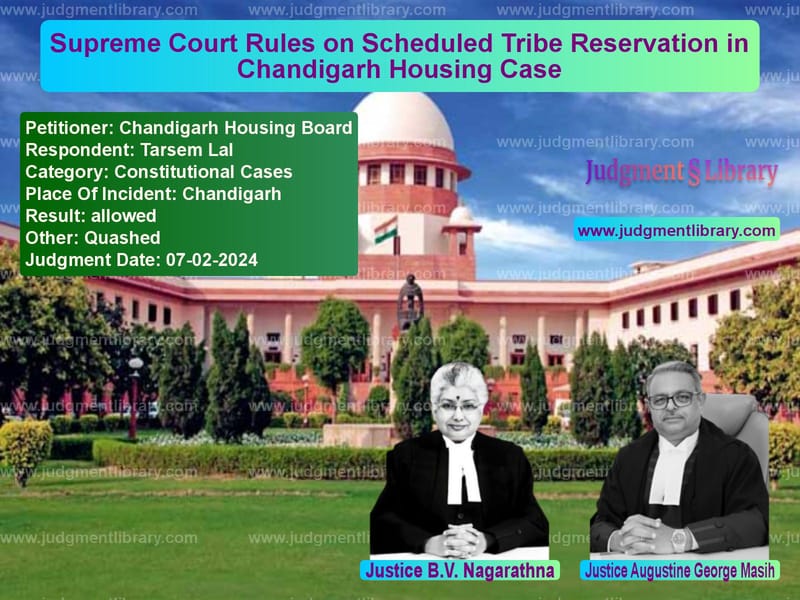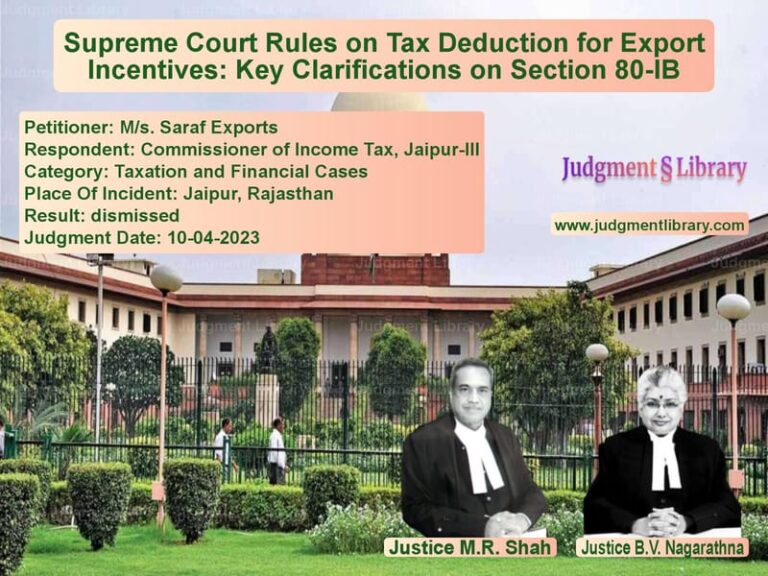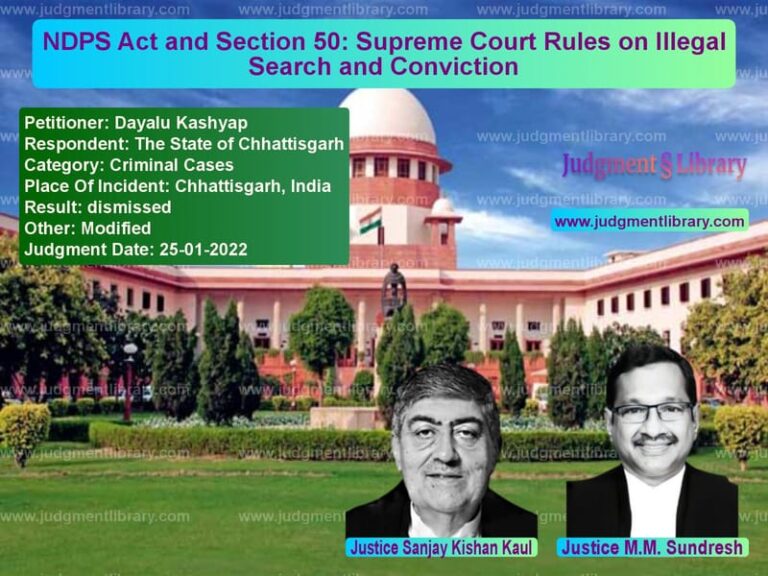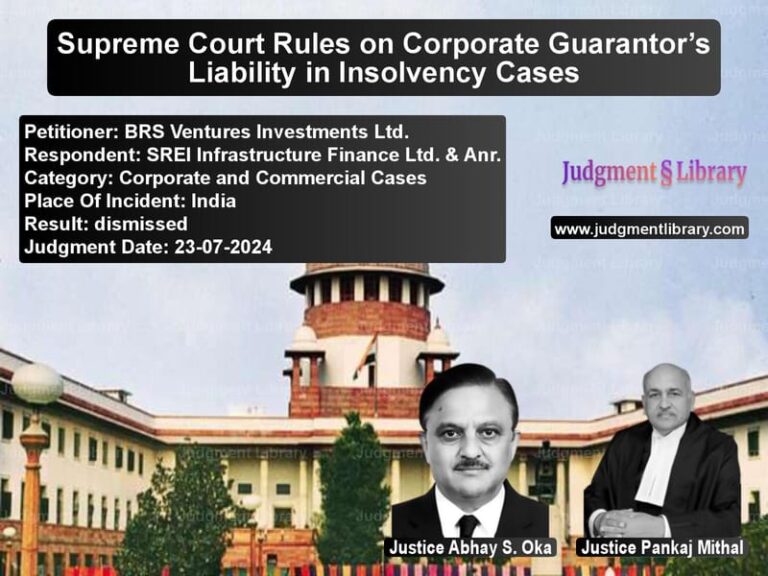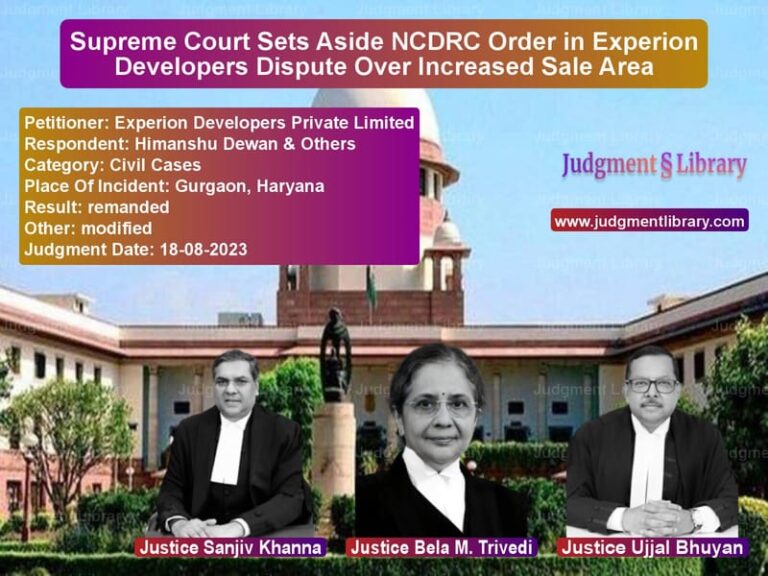Supreme Court Rules on Scheduled Tribe Reservation in Chandigarh Housing Case
The Supreme Court, in the case of Chandigarh Housing Board v. Tarsem Lal, addressed the issue of reservation for Scheduled Tribes in Chandigarh. The ruling clarified that in the absence of a Presidential notification under Article 342 recognizing Scheduled Tribes in Chandigarh, no reservation benefits could be extended to migrants from other states who belong to Scheduled Tribes.
Background of the Case
The case originated from an advertisement issued by the Chandigarh Housing Board on June 28, 1983, inviting applications for the allotment of houses. A total of 35 houses in the HIG (Upper) and HIG (Lower) categories were reserved for Scheduled Castes and Scheduled Tribes. The respondent, Tarsem Lal, applied for a house under the Scheduled Tribe category, claiming he belonged to a Scheduled Tribe recognized in the state of Rajasthan.
The issue arose when the Chandigarh Housing Board sought clarification regarding the reservation for Scheduled Tribes, as there was no Presidential notification under Article 342 identifying Scheduled Tribes in Chandigarh. Despite this, the respondent pursued legal action when his application was rejected.
Key Legal Issues
- Whether the respondent, a Scheduled Tribe member from Rajasthan, was eligible for reservation benefits in Chandigarh.
- Whether a Presidential notification under Article 342 is a prerequisite for extending Scheduled Tribe benefits in a Union Territory.
- Whether the Chandigarh Housing Board’s decision to reserve houses for Scheduled Tribes without a Presidential notification was valid.
Petitioner’s (Chandigarh Housing Board) Arguments
- There was no Presidential notification under Article 342 identifying any Scheduled Tribe in Chandigarh.
- The respondent, though a Scheduled Tribe member in Rajasthan, could not claim similar status in Chandigarh.
- Without a valid notification, the Housing Board had no legal basis to allot houses under a non-existent reservation category.
Respondent’s (Tarsem Lal’s) Arguments
- He had been a permanent resident of Chandigarh for 20 years and should be entitled to reservation benefits.
- The Chandigarh Housing Board’s advertisement did not restrict Scheduled Tribe applicants to those originally from Chandigarh.
- Government communications suggested that benefits should be extended to Scheduled Tribe members migrating from other states.
Supreme Court’s Observations
The Bench, comprising Justices B.V. Nagarathna and Augustine George Masih, made key observations:
- “A Presidential notification under Article 342 is a sine qua non for recognizing Scheduled Tribes in a Union Territory.”
- “The Chandigarh Housing Board’s advertisement was erroneous as it invited applications from Scheduled Tribes without legal backing.”
- “A person belonging to a Scheduled Tribe in one state cannot automatically claim Scheduled Tribe status in another state or Union Territory without a specific notification.”
- “Government correspondence cannot override the constitutional requirement of a Presidential notification.”
Key Legal Findings
- Only a Presidential notification under Article 342 can recognize Scheduled Tribes in a state or Union Territory.
- The absence of such a notification for Chandigarh means no Scheduled Tribe reservation can be extended.
- The respondent could not claim Scheduled Tribe status in Chandigarh based on his status in Rajasthan.
- The Chandigarh Housing Board’s attempt to reserve houses for Scheduled Tribes without a legal mandate was invalid.
Final Judgment
The Supreme Court ruled:
“The impugned judgment of the High Court affirming the judgment of the First Appellate Court, which in turn affirms the judgment of the Trial Court, is set aside. The appeal is allowed, and the suit filed by the respondent is dismissed.”
Key Takeaways from the Judgment
- A Scheduled Tribe member from one state cannot claim the same status in another state or Union Territory without a Presidential notification.
- Government communications cannot override constitutional provisions regarding Scheduled Tribe recognition.
- Advertisements or policies granting benefits without a legal basis are invalid.
- The ruling reinforces the necessity of a Presidential notification for Scheduled Tribe status in a specific region.
Impact of the Judgment
This ruling has significant implications for the recognition of Scheduled Tribes and their entitlement to benefits across different states and Union Territories:
- Prevents unauthorized extension of reservation benefits.
- Reaffirms the importance of Presidential notifications in defining Scheduled Tribe status.
- Ensures uniform application of constitutional provisions across different territories.
- Provides clarity to administrative bodies on reservation policies.
Conclusion
The Supreme Court’s decision in Chandigarh Housing Board v. Tarsem Lal reinforces the constitutional framework for Scheduled Tribe reservations. By setting aside the lower court’s ruling, the Court ensured that reservation benefits are granted strictly per legal and constitutional mandates. This judgment will serve as an essential precedent for similar cases in the future.
Petitioner Name: Chandigarh Housing Board.Respondent Name: Tarsem Lal.Judgment By: Justice B.V. Nagarathna, Justice Augustine George Masih.Place Of Incident: Chandigarh.Judgment Date: 07-02-2024.
Don’t miss out on the full details! Download the complete judgment in PDF format below and gain valuable insights instantly!
Download Judgment: chandigarh-housing-b-vs-tarsem-lal-supreme-court-of-india-judgment-dated-07-02-2024.pdf
Directly Download Judgment: Directly download this Judgment
See all petitions in Fundamental Rights
See all petitions in Constitution Interpretation
See all petitions in Public Interest Litigation
See all petitions in Judgment by B.V. Nagarathna
See all petitions in Judgment by Augustine George Masih
See all petitions in allowed
See all petitions in Quashed
See all petitions in supreme court of India judgments February 2024
See all petitions in 2024 judgments
See all posts in Constitutional Cases Category
See all allowed petitions in Constitutional Cases Category
See all Dismissed petitions in Constitutional Cases Category
See all partially allowed petitions in Constitutional Cases Category

